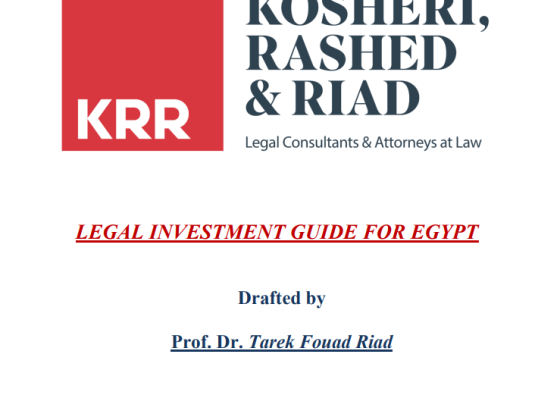Egypt has embarked on a journey to stimulate economic growth and development by proactively seeking to attract both foreign and domestic investments. A significant stride in this direction was achieved through the recent amendment of Investment Law No. 72 for 2017 (the “Investment Law”) by virtue of Decree No. 160 for 2023. This amendment aims to create a more attractive and investor-friendly business landscape in Egypt. In this comprehensive analysis, we will delve into the recent amendments to critical articles of the Investment Law, including Articles 9, 11, 12, 13, 14, 17, 20, 34, and 40. These amendments encompass a wide range of investment regulations and procedures, spanning incentives, licensing, and environmental considerations.
Our focus will be on understanding the core changes introduced to the Investment Law, assessing their potential positive effects on the Egyptian economy, and scrutinizing any potential negative impacts that merit consideration. By examining these amendments in detail, we aim to shed light on the evolving investment landscape in Egypt and offer insights into the opportunities and challenges that may arise for investors and the nation’s economic trajectory.
Article (9)
One of the key amendments to Article (9) of the Investment Law is the expansion of eligibility criteria for general incentives. Previously, only projects established after the implementation of the Investment Law were eligible for these incentives. However, the revised Article extends this privilege to all investment projects, regardless of their establishment date. This inclusivity aims to create a more accessible and attractive investment environment.
Additionally, the amendment clarifies that eligibility for general incentives is not limited to specific legal systems under which investment projects were established. This ensures that all projects, regardless of their legal status or establishment date, can benefit from the general incentives outlined in the Investment Law.
Despite the broader eligibility criteria, the amendment maintains the exclusion of projects established under the free zones system. This exclusion ensures that the unique incentives offered in these zones continue to serve their intended purpose effectively.
The broader eligibility criteria for general incentives are expected to have several positive impacts on the Egyptian economy. It simplifies the application process for incentives, reducing bureaucratic hurdles and making investment more accessible for both local and foreign investors.
Article (11) and (11 bis)
The amendment to Article (11) introduces changes to investment incentives based on sector and geographical location. The article focuses on providing tax deductions and cash incentives to encourage investments in specific sectors and regions within Egypt.
The original text of Article (11) allowed for investment projects established after the implementation of the Investment Law to receive investment incentives based on two sectors: Sector (A) and Sector (B). In this regard, Sector (A) includes areas with the highest developmental needs, while Sector (B) covers the remaining areas of the country.
The amended Article (11) retains the two sectors but now identifies Sector (A) based on comprehensive data and statistics obtained from the Central Agency for Public Mobilization and Statistics. This data-driven approach enhances transparency and accuracy in determining the eligible sectors.
Moreover, the amendment introduces Article (11 bis), offering cash incentives to investment projects engaged in specified industrial activities and their expansions. This provision aims to attract foreign investments by offering cash incentives based on the value of taxes levied on income derived from eligible activities. The timely disbursement of these incentives and their non-taxable status benefit investors, encouraging further investments.
However, the cash incentives may pose challenges to government revenue from corporate taxes, necessitating careful fiscal management.
Article (12)
Article (12) underwent a significant change by extending the maximum period for establishing new companies or facilities for investment projects from three (3) years to nine (9) years. The Cabinet can grant additional extensions, provided they do not exceed nine (9) years in total.
This extension offers investors greater flexibility, particularly for projects with longer planning and execution timelines. It is expected to attract more long-term investments, fostering sustainable growth and development. However, it may delay the realization of economic benefits and introduce uncertainty.
Balancing flexibility for investors with timely contributions to the economy is essential for the effective implementation of this amendment.
Article (13)
The amended Article (13) retains existing incentives and introduces new ones. These incentives include special customs outlets, cost coverage for utilities, technical training for workers, and land allocation. The amendment adds exemptions from usufruct charges, infrastructure costs, and utility consumption costs for a specified period. These incentives aim to create a sense of urgency for investors, promote economic growth, and improve infrastructure.
However, the government must manage potential financial strain due to these incentives efficiently.
Article (14)
The amendment to Article (14) streamlines the process of issuing certificates for incentives and ensures their applicability to all eligible projects. This enhances administrative efficiency and simplifies procedures for businesses.
Article (17)
The amendment to Article (17) emphasizes the importance of a comprehensive investment map, requiring detailed project information and cooperation from relevant authorities. This improves the accuracy and usefulness of the investment map.
Article (20)
The amended Article (20) provides greater transparency in granting the “Golden License” for strategic projects. It includes incentives, oversight measures, and corrective actions, promoting accountable investments.
Article (34)
The amendment to Article (34) expands eligible industries for free zones but maintains exclusions for security-related sectors. Balancing economic opportunities with national security remains crucial.
Article (40)
The amendment to Article (40) strengthens environmental protection and waste management practices by incorporating the Waste Management Law and distinguishing waste imports from regular imports.
Conclusion
The recent amendments to Egypt’s Investment Law signify the country’s commitment to creating a more attractive investment environment, fostering economic diversification, and aligning with global standards. While these amendments bring numerous positive impacts, addressing potential challenges in enforcement, administrative efficiency, and monitoring is crucial for their effective implementation. Collaborative efforts between government authorities, investors, and stakeholders are essential for Egypt’s continued economic development and prosperity. These amendments position Egypt as an attractive destination for both foreign and domestic investments, paving the way for sustainable growth and development.




